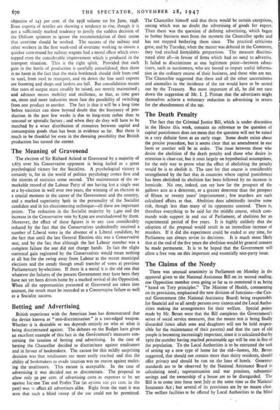Betting and Advertising
British experience with the American loan has demonstrated that the device known as " non-discrimination " is a two-edged weapon. Whether it is desirable or not depends entirely on who or what is being discriminated against. The debates on the Budget have given an excellent example of this fact in the Government's measures con- cerning the taxation of betting and advertising. In the case of betting the Chancellor decided to discriminate against totalisators and in favour of bookmakers. The excuse for this mildly surprising decision was that totalisators are more easily reached and that the ability of bookmakers to evade taxation was no reason against mulct- ing the totalisators. This excuse is acceptable. In the case of advertising it was decided not to discriminate. The proposal to allow only so per cent. of advertising costs as expenses to be set against Income Tax and Profits Tax (as against too per cent. in the past) was ro affect all advertisers alike. Right from -the start it was seen that such a blind sweep of the axe could not be permitted. The Chancellor himself said that there would be certain exceptions, among which was no doubt the advertising of goods for export. Then there was the question of defining advertising, which began to bother business men from the moment the Chancellor spoke and has not stopped bothering them since. The practical criticisms grew, and by Tuesday, when the matter was debated in the Commons, they had reached formidable proportions. The measure discrimi- nated after all—in favour of firms which had no need to advertise. It failed to discriminate at one legitimate point—between adver- tisers, such as auctioneers, who are bound to impart useful informa- tion in the ordinary course of their business, and those who are not. The Chancellor suggested that these and all the other uncertainties and anomalies in the incidence of the tax would have to be sorted out by the Treasury. But most important of all, he did not turn down the suggestion of Mr. I. J. Pitman that the advertisers might themselves achieve a voluntary reduction in advertising in return for the abandonment of the tax.




























 Previous page
Previous page